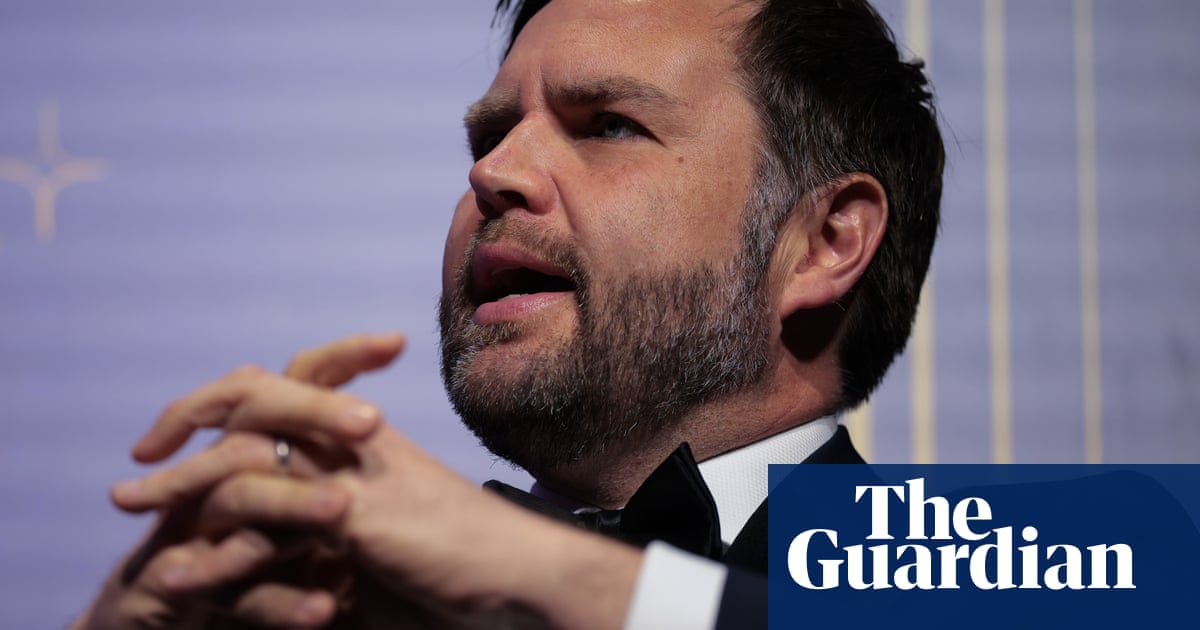Several Democratic state attorneys general warned that the country was in the grip of a full-blown constitutional crisis, as they battle Donald Trump in court over actions they argue are lawless and in some cases brazenly unconstitutional.
“We are on the brink of a dictatorship, and America has never been in a more dangerous position than she is today,” Kris Mayes, the attorney general of Arizona, said at a press conference in Los Angeles on Tuesday.
Mayes alleged Trump’s stunning power grabs, his disregard for the rule of law, his alliance with – and reliance on – billionaire Elon Musk, and his attacks on judges and journalists amounted to “an ongoing coup against American democracy”.
“He was elected president, but no one put a crown on this guy’s head,” said Delaware’s attorney general, Kathy Jennings, co-chair of the Democratic Attorneys General Association, which convened its quarterly policy conference in Los Angeles. The state attorneys general spoke to reporters during a round table on the sidelines of the event.
“We have three branches of government,” Jennings continued. “He thinks there’s one. We have separation of powers. He thinks there is none.”
Matthew Platkin, attorney general of New Jersey, said that Trump – in carving out new executive powers and forcing clashes with Congress and the judiciary – had thrust the country into a constitutional crisis.
“No one’s going to wave a flag and say it has started,” he said, adding that the scope and scale of Trump’s efforts to dismantle the federal government would have devastating, real-life consequences for Americans – not just the country’s system of government. “I think the American public needs to wake up and see that because the harms that people are experiencing are unprecedented,” he said.
As Trump moves to expand his power without any resistance from Republicans in Congress, the courts have emerged as the central threat to his agenda with Democratic attorneys general acting as the “last bastion of defense”, Platkin said.
Among the attorneys general, there was some nuance about whether the current situation constituted a constitutional crisis. Rob Bonta, the attorney general of California, said he believed a crisis was looming but that the country had “not yet” tipped over the threshold.
“We are being stress-tested, but we’re durable,” he said.
There was widespread concern over the growing attacks on the judiciary by Trump, his vice-president, JD Vance, and other senior Republicans. The Illinois attorney general, Kwame Raoul, said the threats, both implicit and explicit, displayed a “total disregard for our constitution and for our systems that create those checks and balances”.
The attorneys general spoke on Tuesday as they notched another legal victory. A federal appeals court in Boston rejected a Trump administration bid to reinstate a sweeping freeze on federal funding in a lawsuit brought by nearly two dozen Democratic-led states. The decision came one day after a judge found the Trump administration had defied an earlier order – as part of a legal case brought by a coalition of Democratic attorneys generals.
They have also filed lawsuits challenging Trump’s attempts to end birthright citizenship, slash research funding from the National Institutes of Health and permit Elon Musk’s “department of government efficiency” from accessing Americans’ private data. In each case they have won favorable rulings that temporarily pause or block the actions from taking effect. It will take time for the myriad challenges to reach the supreme court, and Trump may still prevail before a bench tilted heavily in his favor.
But the Democrats liked their odds.
after newsletter promotion
“We are 4-0 against the unconstitutional actions of this president,” Mayes said. “And we will continue to do a lot of winning as long as this president continues to violate the law.”
Of the six attorneys general who joined the round table, Mayes was the only Democrat to represent a state that voted for Trump in the 2024 election. But her office, she said, has been overwhelmed by calls from constituents alarmed by the president’s actions.
“Arizonans … voted for border security and a better economy. They did not vote for a dictatorship,” she said, noting that callers were especially upset that members of the “department of government efficiency” had accessed sensitive treasury department payment systems.
“No one wants Elon Musk’s hands on their private data – absolutely no one wants that in Arizona,” she said.
Arizona joined 18 states in suing the Trump administration, arguing that the “department of government efficiency” was “attempting to access government data to support initiatives to block federal funds from reaching certain disfavored beneficiaries”. A federal judge agreed and blocked Musk’s team from accessing sensitive treasury department records – a decision that set off an escalating series of attacks by Trump and his allies.
Musk lashed out on his social media platform, X, calling the judge “corrupt” and suggesting he be impeached. The next day, Vance, a graduate of Yale Law School, wrote on X: “Judges aren’t allowed to control the executive’s legitimate power.” On Capitol Hill, the House speaker, Mike Johnson, said that courts should take a “step back” from the challenges. Arizona congressman Eli Crane declared that he was drafting articles of impeachment against the Manhattan-based US district judge Paul Engelmayer, who issued the injunction against Musk’s “department of government efficiency”.
And in the Oval Office on Tuesday, Trump, with Musk at his side, claimed that judges were standing in the way of his efforts to root out corruption in government, asserting: “It seems hard to believe that a judge could say, ‘We don’t want you to do that,’ so maybe we have to look at the judges because I think that’s a very serious violation.”
“This is frightening stuff because it’s a direct attack on a judge’s role,” Jennings said. The prospect of a president simply ignoring court decisions he doesn’t like would pose “an existential question for this country,” she added.

 3 months ago
51
3 months ago
51

















































